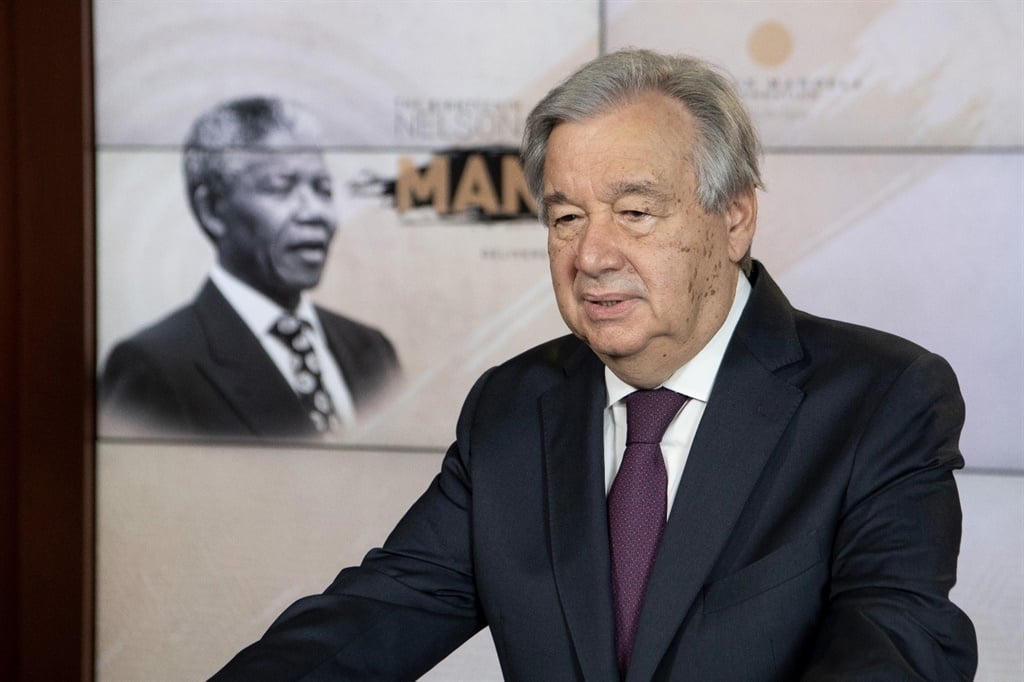


UN Secretary-General, António Guterres. (@NelsonMandela, Twitter)
- South African civil society leaders have called for a stronger social contract to overcome inequalities in all its forms.
- Speaking at the 18th Nelson Mandela Annual Lecture, they called for not only leaders, but members of the public to encourage social change.
- “This new social contract is actually between us, we need to create a culture where our success is not measured by our personal wealth or our GDP, but the ways in which we contribute to making the world the place we always hoped it would be.”
As the world celebrates International Nelson Mandela Day, civil society leaders have called on not only those in power but also members of the public to look inward to a new social contract.
Speaking before UN Secretary-General António Guterres delivered his lecture on “Tackling the inequality pandemic: A new social contract for a new era” on Saturday, civil society leaders were able to make their call for change.
READ | Mandela Day lecture to be delivered by UN secretary-general, and dedicated to Zindzi Mandela
Acclaimed advocate Tembeka Ngcukaitobi said Covid-19 had impacted South Africa in an unequal manner – affecting the poor and elderly disproportionately.
He added he had recently lost two aunts in the former Transkei and the hospital, which accommodated them, were overwhelmed and unequipped.
“Our story, of course, is not the only one – it is emblematic of the larger story.
“Thousands more are left devastated by the impact of the virus,” Ngcukaitobi said.
“The former Transkei area was recently flagged as one of the poorest in the country. The virus has not merely highlighted the economic deprivation of the area it has deepened it, confirming the structural violence that many poor South Africans are subjected to.”
He added he believed Covid-19 was a poverty disease.
“Older, poorer people with comorbidities will likely die of Covid-19. People with access to good health care services will likely survive.
“It is time we recognise this both as a country and as the world, but we also have to recognise that race in South Africa looms large in the story.”
Ngcukaitobi said there was a link between race and class in South Africa.
“This, of course, is a function of the past – we inherited an economy designed to maintain white economic privilege – an apartheid economy [which] continues to define access to healthcare services.”
The legacy of racialised inequality should be confronted, he added.
“We as individuals must also do more, it is time that we develop compassion, solidarity and ubuntu.”
ALSO READ | Beyond the numbers: The social impact of Covid-19
The executive director at Reimagine SA and also Mandela’s great-grandchild, Luvuyo Madasa, called for more humanity in our engagements with each other.
“In all these discussions, may they move beyond today to become a reality in action, a reality in heartfelt connection, inclusivity and working together towards a common goal.
“The Covid-19 pandemic has shown us that our lauded solutions are unfortunately inadequate in dealing with the root causes of poverty, deprivation, separation and all the other human oppressions that come with us choosing not to do enough,” Madasa said.
Sarah Summers, who works at the Social Justice Coalition and is the creator of Coloured Mentality, reiterated the vast inequality between rich and poor in South Africa.
“We think that uprisings need to be this violent, bloody thing but the violence already exists – what if we just down the master’s tools and put people first?”
She pointed out the protections afforded to the rich, while poor people starved and were left homeless.
“We cannot make a corrupt system just. It is time to end the system of inequality that is being administered by corrupt governments to serve the will of global elites.”
ALSO READ | Millions have lost their jobs during the lockdown, impacting social welfare and food poverty
Summers said instead, healing and justice should be at the centre of transformation.
“What will it take for you to realise that you have agency and that we only feel this helpless because we are scared that we won’t survive, but we are barely living.
“This new social contract is actually between us, we need to create a culture where our success is not measured by our personal wealth or our GDP, but the ways in which we contribute to making the world the place we always hoped it would be,” she added.

